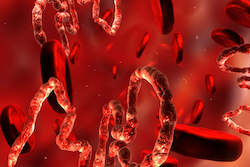New research brings Ebola vaccine closer
The EU-supported EbolaVac project was funded under the Emergency procedure launched by the European Commission in response to the Ebolavirus Zaire outbreak of 2014. The project covered several clinical phase 1 and 2 studies that had to be launched in multiple countries to select the optimal dose and characterise safety and immunogenicity profiles of the vaccine. The selection and preparation had to occur with the shortest delay possible without compromising quality and ethical aspects. Building on their extensive prior experience in malaria vaccine clinical development, both in Switzerland and in Africa, a multi-disciplinary team lead was asked to perform an expedited clinical trial at the Centre Hospitalier Universitaire, Vaudois. They used the ChAd3-EBO Z vaccine. “Our goal was to make the vaccine available to frontline health care workers at risk and to be used in the containment of Ebola outbreaks in the affected areas in Africa,” explains principle researcher Professor Blaise Genton, Head of Travel Clinic at University of Lausanne. With speed being critical, the project had filed its submissions and been approved by ethics and regulatory authorities within two months. “We managed to get up and running exceptionally quickly,” explains Prof Genton. Within three months after the enrolment of the 120 subjects, EbolaVac was able to provide the World Health Organisation with 28-day results on safety and immunogenicity. “This trial has been conducted at a phenomenal speed,” says Prof Genton, “but with all requirements for high standard fulfilled and without shortcuts, thanks to the team’s hard work and dedication.” This trial was a critical part of a phase 1 programme that demonstrated that the vaccine was safe and immunogenic at the doses tested. This was pivotal for decision-making to proceed to large phase 2 studies in adults and children of five African countries. Meeting the demand for a swift response was particularly challenging, “The development of clinical documents for the phase 2 studies, such as the protocols, informed consent forms, investigational brochure, necessitated virtually real-time review by all national regulatory authorities and ethical committees. To accelerate this, a collective review and approval process was organised by WHO in December 2014, that gathered all relevant stakeholders,” says Dr François Roman (Clinical & Epi Development Leader for Diseases of the Developing World at GSK Vaccines). In addition to the phase 2 studies and despite time constraints, the EbolaVac programme also investigated the immunological effects of booster vaccination with MVA-EBO Z in a clinical trial in Senegal. This study, which was run by the University of Oxford, showed that the booster was well tolerated and that it substantially increased vaccine responses. The EbolaVac programme has substantially contributed to new scientific information on the ChAd3-EBO-Z vaccine. Although no efficacy data could be collected for the vaccine, and although the path towards registration of ChAd3-EBO-Z seems difficult in absence of these data, the programme has paved the way for the preparedness against future outbreaks. As Dr Rip Ballou (Vice President & Head, US R&D Center Global Vaccines R&D) explains, “Ongoing Ebola vaccine approaches looking at other species will capitalise on the robust dataset generated by EbolaVac and facilitate future developments. Such developments will also build on the project’s effort to improves the productivity and formulation of ChAd-based Ebola vaccines, as well as on collective efforts to generate widely-accepted immunological read-outs.” More generally, EbolaVac also contributed to the increase in global awareness of emerging, infectious threats in Africa. The project drew attention to the need to accentuate preparedness efforts, such as the creation of new, cross-institutional organisations like the Coalition for Epidemic Preparedness and Innovation(opens in new window). “EbolaVac has concretely translated into the strengthening of clinical research capacity and expertise in African countries that may be hit again by these threats in the future,” Dr Philippe Denoel (Head of External R&D at GSK Vaccines) says.







